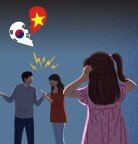[Op-Ed] `Turn Off Your Computer`
Google CEO Eric Schmidt is a businessman who has earned both honor and money with the dawn of the digital era. He has a Ph.D. in computer engineering and has worked as chief technology officer at Sun Microsystems and CEO at Linux-maker Novell. Schmidt took over Google in 2001. He is also politically powerful enough to advise U.S. President Barack Obama.
Yet Schmidt, a huge beneficiary of the computer revolution, stressed the importance of an analog life at the commencement speech of the Univ. of Pennsylvania. He told some 6,000 graduating seniors, Get out of the virtual world of the computer for a while, and live a life that you can make a real relationship in the real world. Nothing beats holding the hand of your grandchild as he walks his first steps," he added. Turn off your computer. You`re actually going to have to turn off your phone and discover all that is human around us. He cited not only the example of a grandfather and his grandchild, but hugging one`s children after arriving home after work and sharing the happiness from an accomplishment with colleagues by opening the heart.
Ikujiro Nonaka, professor emeritus at Hitotsubashi University in Japan, also emphasizes the importance of workplace and people. He says handing down empirical knowledge through the apprentice system is useful, stressing the importance of inexplicit knowledge accumulated through experience. He said this is just as important as physical knowledge that is conceptualized and expressed through language. A true leader in each field requires leadership that brings innovation while studying both practice and theory. To do so, common sense such as philosophy, history, literature and the ability to understand people are needed. Western scholars have focused on technical analysis using computers but are now looking to reality.
The positive impact the computer revolution has brought to the modern world is enormous. Excessive indulgence in virtual reality, however, has prevented many young people from having relationships with people in the real world. A digital era where technological advancement is accelerated does not change the essence of human beings. Sometimes, the idea of turning off the computer and discovering "living humans" nearby hits home.
Editorial Writer Kwon Sun-hwal (shkwon@donga.com)







